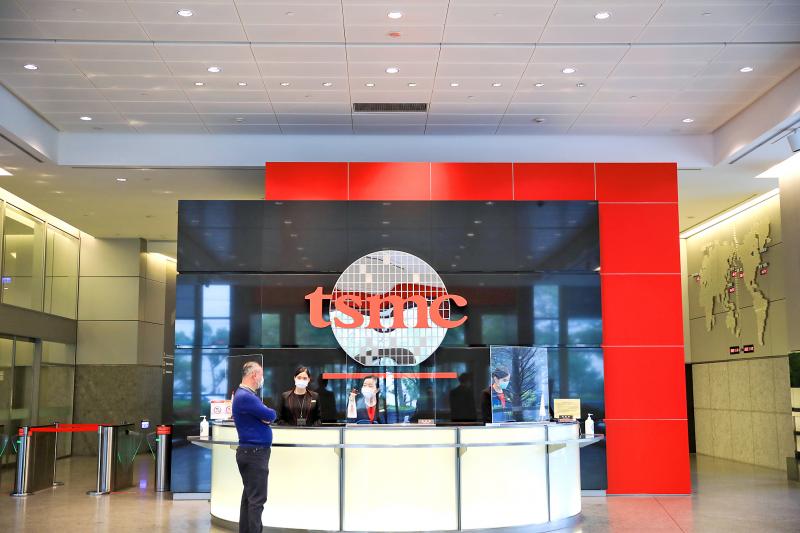Taiwan Semiconductor Manufacturing Co (TSMC, 台積電) yesterday said that Japan-based Denso Corp will take a minority stake in its Japanese venture with Sony Semiconductor Solution Corp, a partnership that is to build a plant in Japan amid a scarcity of chips for automobiles.
With an investment of US$350 million, Denso would hold a more than 10 percent stake in Japan Advanced Semiconductor Manufacturing Inc (JASM) in Kumamoto Prefecture, TSMC said in a statement.
“Semiconductors are becoming increasingly important in the automotive industry as mobility technologies evolve, including automated driving and electrification,” Denso chief executive officer Koji Arima said in the statement. “Through this partnership, we contribute to the stable supply of semiconductors over the medium to long term and thus to the automotive industry.”

Photographer: I-Hwa Cheng/Bloomberg
Construction of the new fab is to begin this year, with production to begin by the end of 2024, TSMC said.
TSMC plans to enhance JASM’s capabilities with 12-nanometer and 16-nanometer process technologies in addition to the previously announced 22-nanometer and 28-nanometer technologies, it said.
The new facility would increase monthly capacity to 55,000 12-inch wafers, it said.
Capital expenditure for the new fab is estimated to be US$8.6 billion, TSMC said, adding that it would create about 1,700 jobs.
TSMC also said it is recruiting a business intelligence analyst to help collect data regarding political economics for internal analysis.
It is the first time that the firm has recruited for such a position as geopolitical issues become more important for multinational enterprises.
TSMC three years ago hired Peter Cleveland to enhance its communications with government agencies in the US.
Cleveland is a vice president of TSMC who directs global policy.
Its board of directors yesterday approved the distribution of a NT$2.75 per share cash dividend for last quarter.
The board approved distribution of performance bonuses and profit sharing totaling NT$71.2029 billion (US$2.55 billion) for last year and approved capital appropriations of US$20.94 billion.
To finance TSMC’s capacity expansion and pollution prevention related expenditure, the board approved the issuance in Taiwan of up to NT$60 billion of unsecured corporate bonds and up to US$1 billion of US dollar-denominated unsecured corporate bonds.
The board approved the issuance of 1.387 million shares as restricted stock awards for employees to attract and retain executives and talent, and to link compensation with shareholders’ interests and environmental, social and corporate governance achievements.
To offset dilution from the increase in shares due to the issuance, the board approved a program for the company to buy back its common shares on the Taiwan Stock Exchange.
The board approved the issuance of no more than 2.96 million common shares for restricted stock awards, with the plan to be presented to shareholders at the annual meeting on June 8 for approval.

South Korea’s equity benchmark yesterday crossed a new milestone just a month after surpassing the once-unthinkable 5,000 mark as surging global memory demand powers the country’s biggest chipmakers. The KOSPI advanced as much as 2.6 percent to a record 6,123, with Samsung Electronics Co and SK Hynix Inc each gaining more than 2 percent. With the benchmark now up 45 percent this year, South Korea’s stock market capitalization has also moved past France’s, following last month’s overtaking of Germany’s. Long overlooked by foreign funds, despite being undervalued, South Korean stocks have now emerged as clear winners in the global market. The so-called “artificial intelligence

‘SEISMIC SHIFT’: The researcher forecast there would be about 1.1 billion mobile shipments this year, down from 1.26 billion the prior year and erasing years of gains The global smartphone market is expected to contract 12.9 percent this year due to the unprecedented memorychip shortage, marking “a crisis like no other,” researcher International Data Corp (IDC) said. The new forecast, a dramatic revision down from earlier estimates, gives the latest accounting of the ongoing memory crunch that is affecting every corner of the electronics industry. The demand for advanced memory to power artificial intelligence (AI) tasks has drained global supply until well into next year and jeopardizes the business model of many smartphone makers. IDC forecast about 1.1 billion mobile shipments this year, down from 1.26 billion the prior

People stand in a Pokemon store in Tokyo on Thursday. One of the world highest-grossing franchises is celebrated its 30th anniversary yesterday.

Chinese artificial intelligence (AI) start-up DeepSeek’s (深度求索) latest AI model, set to be released as soon as next week, was trained on Nvidia Corp’s most advanced AI chip, the Blackwell, a senior official of US President Donald Trump’s administration said on Monday, in what could represent a violation of US export controls. The US believes DeepSeek will remove the technical indicators that might reveal its use of American AI chips, the official said, adding that the Blackwells are likely clustered at its data center in Inner Mongolia, an autonomous region of China. The person declined to say how the US government received